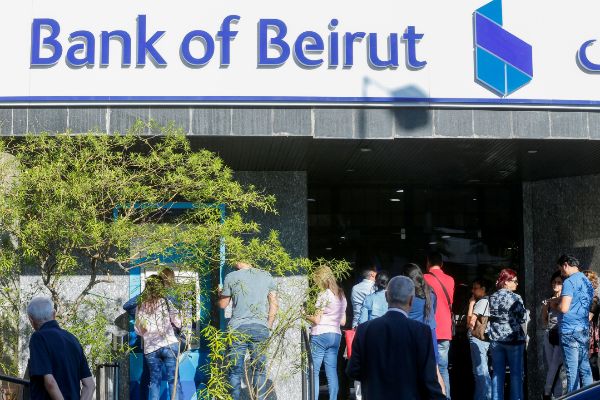- Crisis: The WhatsApp Revolution Graves Lebanese Prime Minister
- Syria: Lebanon, a country at the limit
Many Lebanese went to their bank offices, reopened this Friday for the first time in two weeks , to find only half of their salaries. Since October 17, a wave of protests shakes the country, demanding the resignation of the ruling elite, which citizens accuse of "corruption" and "nepotism." As a result of the demonstrations, the prime minister resigned on Tuesday and now the parties must negotiate the formation of a new government.
The social response has paralyzed the country for 15 days, with shops, schools and banks closed. Between yesterday and today, although the demonstrations continue, life is returning to normal, but the reopening of the banks has revealed another reality: the country is heading towards its worst economic crisis since the end of the civil war, in 1990 .
Even before citizen mobilizations began, the country was going through a severe fiscal crisis, fueled by years of misgovernment and mismanagement. With a public debt of 86,000 million dollars (155% of its GDP), Lebanon is one of the three most indebted countries in the world . And 80% of that debt is owned by commercial banks, in the hands of prominent ruling families, which charge high interest and the Central Bank.
The Lebanese pound, anchored to the dollar with an official fixed exchange rate that values each greenback at 1.5 pounds since 1997, is heading towards devaluation , experts say. The shortage of dollar bills that has been going on for months led banks to restrict cash withdrawals in US currency and has led to the emergence of a parallel market in which the dollar already reaches 1.9 pounds after suddenly shooting this last week. A devaluation of more than 25%.
"We will need a miracle"
The initial concern gave way on Friday in long lines to the branches of Beirut and other cities. Although the Lebanese Central Bank has not imposed capital flow restrictions, some banks have implemented their own controls, given the lack of liquidity and fear of a massive withdrawal of deposits. A de facto corralito in which only the withdrawal of $ 2,000 per week is allowed and transfers abroad are prohibited . In Lebanon, 75% of deposits are nominated in dollars.
Some clients left with obvious frustration. "This is crazy. I have only been paid half of the salary this month ... And prices have risen by 22%," Danny Khalil, who works as an administrative officer, tells EL MUNDO.es. "It's going to be hard times for Lebanon. We will need a miracle to get out of this," he adds.
The closure of the banks since the protests began has weighed in the operation of the country. Employers have not been able to distribute their workers' salaries and small merchants, forced to pay imported goods in dollars, have been thrown into the black market to obtain them. As a result of the variation between the official price of the pound and the informal exchange, prices have risen between 20 and 25% . It is feared that commodities such as wheat, rice or sugar will begin to be scarce.
The Central Bank has assured that it will prioritize dollars for imports of fuel, medicines or wheat, given the calls of businessmen for how difficult it is for them to obtain dollars to pay for their transfers abroad. The spokesman for the service station union, Fadi Abu Chakra, told Reuters on Thursday that the country has been importing fuel for two weeks and that gas stations have reservations for "three or four days . " Some have even closed.
Being in office, the Government presiding over the resigner Saad Hariri has no powers to implement the economic reforms that the country needs to avoid the abyss. Since it took nine months of negotiations to compose the Cabinet that has just collapsed, it is feared that political instability will continue. The head of state, Michel Aoun, intervened Thursday night to advocate the composition of a technocratic government . His ally, Hasan Nasrala, leader of the Shi'a Hizbullah party, so far opposed to the resignation of the Government, called on Friday to quickly form a new Cabinet that, he said, should "listen to the protesters' demands and work to restore confidence ". The citizen's response requires the resignation of all political positions, including Aoun, and the formation of a technocratic executive.
"If next week there is no solution , people will return to the street massively, there will be counter-demonstrations of the supporters of the president and Hezbollah and the problems will really begin. President Aoun must resign," concluded Khalil, who has participated in the protests
According to the criteria of The Trust Project
Know more- World
- Lebanon
Middle East The Lebanese Government agrees to lower politicians' salaries by 50%, in a gesture to defuse protests
Middle EastThe Lebanese president calls for dialogue but warns protesters that "a regime cannot be changed on the street"
Middle EastHizbullah leader warns of the risk of a new civil war in Lebanon if there is a "power vacuum"

